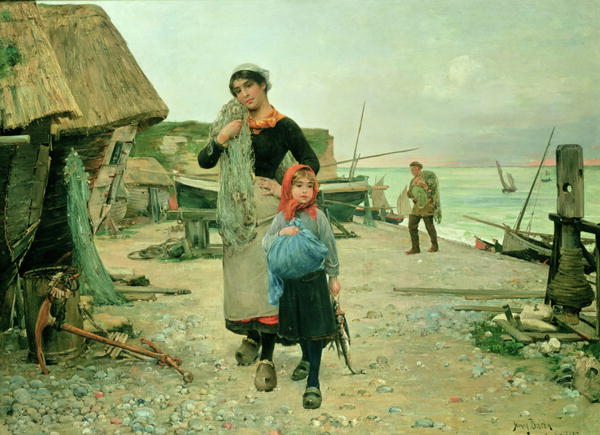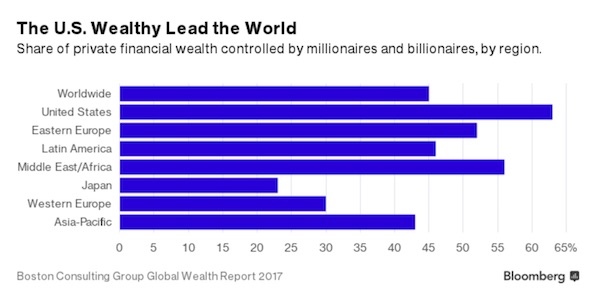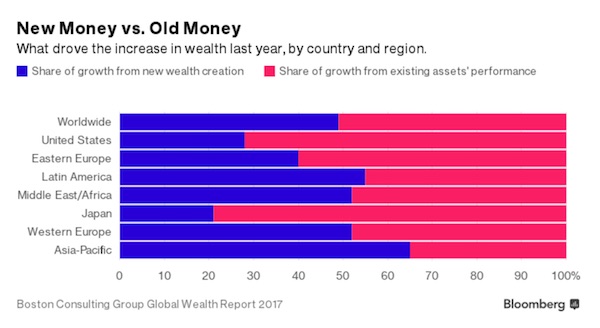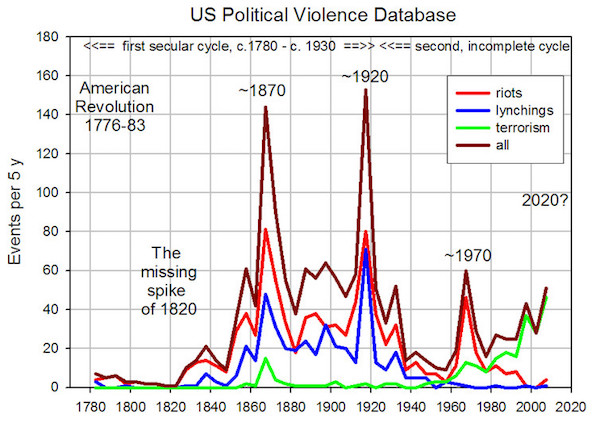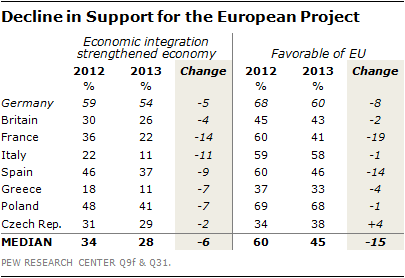
J.J. Grandville ‘A Comet’s Journey’, Illustration from ‘Un Autre Monde’ 1844
Oxfam. I’m wondering if I should warn this is not for the faint of heart, or say don’t read on an empty stomach. If so, hereby. I know I found it hard.
The first and foremost thing the BBC last week felt its audience should know about the sleaziest scandal to come out of Britain in quite some time -and that’s saying something- is that an actress had turned her back on the aid organization. Your news in bite-size pre-chewed headlines.
While a guy who ‘served’ Oxfam in Bosnia claims it’s nobody’s business if he visited the local hookers in his spare time. The head office even specifically refuses to ban staff from doing that. Not violating a staff member’s civil liberties trumps a question like what drives desperate women -girls- into prostitution that same staff member pays for with money donated to aid desperate people.
Someone at the Dutch Oxfam/Novib office complained that his British colleagues should have provided more information, sooner, because now his branch suffers from the scandal (fewer donations). A branch that knew about it at least as far back as 2012, and passed on the info to the Dutch Foreign Ministry and Accounting Office. Who looked at potential -financial- damage in their country, found none, and located a carpet to sweep it under.
The only right choice for us, and our governments, would seem to be to cancel all donations to Oxfam, because apparently nobody connected to the organization is able to figure out who the actual victims are here. They instead portray themselves as the victims.
Of all people, its own chief executive feels a need, when responding to accusations of child sex abuse concerning his organization, to paint himself -and Oxfam- as victims. ‘Anything we say is being manipulated. We’ve been savaged’ . How does that guy hold on to that job?
Charities like Oxfam receive donations to help those people who have fallen victim to the conditions that exist where they live, be they manmade or due to natural disaster. Obviously, if Oxfam cannot (will not) even correctly identify these victims, it has no reason to exist.
Of course Oxfam announces more internal investigations when these accusations come out, but it’s too late. They’ve hush-hushed all previous such investigations, and there’s no reason to believe that won’t happen again. Oxfam has covered up the issues for a long time, likely decades, and if they can no longer cover things up -like now-, they try and make things look like incidents, stand-alone occurrences. This is a pattern.
Of course there are many people involved in international aid who are pure -enough- souls with the best intentions, but that’s simply not enough: sexual predation has infiltrated its ranks to such a degree, and management has refused to take the only appropriate steps against its perpetrators for so long, that sex abuse has become Oxfam’s middle name. And that very much includes child sex abuse.
I’ve been reading a lot about the story over the past 10 days, and one of the things that stand out is that the typical first reaction is to cover up whatever nastiness it is that surfaces, out of fear that donations would suffer. Instead of thinking about the people Oxfam is supposed to help, for which it receives those donations, and put their interests first. That is a death sentence for any aid organization. And rightly so.
It’s quite simple when you think about it: if we allow Oxfam to continue to exist, we accept that the aid we pay for through donations is sold to victims for sex. If you say, as many people do, that shutting down Oxfam will ‘only’ be bad for those in need who rely on it for aid, then that’s what you promote: aid for sex.
Through the many articles I’ve read I’ve seen people finger Oxfam for sex abuse in Haiti, Chad, South Sudan, Ivory Coast, the Philippines, Bangladesh and Nepal. Ten to one that is but a partial list. Other aid organizations cover even more territory. There are specific accusations, just through these articles, from 1999, 2004, 2012, 2015 and 2017. That too is but a partial list.
Let’s see if I can make a coherent story of all this without turning it into an entire book (would not be a problem). Here’s from The Independent, with a headline that takes us right where we need to be:
Oxfam Told Of Aid Workers Raping Children In Haiti A Decade Ago
Aid agencies including Oxfam were warned that aid workers were sexually abusing children in Haiti a decade ago, The Independent can reveal. Children as young as six were being coerced into sex in exchange for food and necessities, according to a damning report by Save the Children, which called for urgent action including the creation of a global watchdog. Its research exposed abuse linked to 23 humanitarian, peacekeeping and security organisations operating in Haiti, Ivory Coast and what was then Southern Sudan. “Our own fieldwork suggests that the scale of abuse is significant,” the report concluded.
“Every agency is at risk from this problem … existing efforts to keep children safe from sexual exploitation and abuse are inadequate.” It identified “every kind of child sexual abuse and exploitation imaginable”, including rape, prostitution, pornography, sexual slavery, assaults and trafficking. One 15-year-old girl in Haiti told how “humanitarian men” exposed themselves and offered her the equivalent of £2 to perform a sex act. “The men call to me in the streets and they ask me to go with them,” said another Haitian girl. “They do this will all of us young girls.”
A six-year-old girl described being sexually assaulted and a homeless girl was given a single US dollar by a “man who works for an NGO” before being raped and severely injured, while boys were also reportedly raped. When asked why the abuse was not reported, children said they feared losing aid, did not trust local authorities, did not know who to go to, felt powerless or feared stigma and retaliation. “The people who are raping us and the people in the office are the same people,” said one girl in Haiti.
Ironically, that report is from Save the Children. Ironic because just today the Telegraph had this:
The former chief executive of Save the Children resigned after he admitted making “unsuitable and thoughtless” comments to three young female members of staff, it emerged on Tuesday. Justin Forsyth, who is now deputy executive director at Unicef, “apologised unreservedly” to the women after sending them text messages commenting on how they looked and what they were wearing. Mr Forsyth’s resignation from Save the Children came just four months after Brendan Cox, a friend of Mr Forsyth and former chief strategist at the charity, quit following separate allegations of sexual misconduct.
Mr Forsyth and Mr Cox worked together at Oxfam and later again as advisors to Gordon Brown in Downing Street. Mr Cox, the widower of the late Jo Cox who was murdered in 2016, admitted at the weekend that he had caused the women “hurt and offence”. Neither Mr Forsyth nor Mr Cox were subject to a formal disciplinary hearing. Save the Children said on Tuesday night that trustees had carried out two internal investigations into the complaints against Mr Forsyth in 2011 and 2015.
Save the Children admitted on Tuesday that it dealt with 193 child protection and 35 sexual harassment cases last year, which led to 30 dismissals.
It’s by no means just Oxfam. But they’re a major player. In more ways than one, unfortunately. Oxfam has some 2,500 staff and 31,000 volunteers through the world. Its annual budget is about half a billion dollars.
Another ‘interesting’ pattern to emerge is that the perpetrators, even if they are penalized, seemingly seamlessly float between aid organizations: get kicked out in one place, start afresh a few months later at the next. This article from IRIN is about the Belgian guy with whom the latest scandal surfaced.
He lived in a splendid $2000 a month Oxfam-sponsored villa in Haiti right after the 2010 earthquake, when most locals didn’t even have a roof over their heads, and threw sex-parties there. None of that hurt him much; he lost his Oxfam job, though only after many years of complaints, but just kept going (and denies just about all):
The man at the centre of a sexual exploitation scandal at aid agency Oxfam was dismissed by another British NGO seven years earlier for similar misconduct, IRIN has found. A former colleague reveals that Roland van Hauwermeiren was sent home from his job in Liberia in 2004 after her complaints prompted an investigation into sex parties there with young local women. Despite this, van Hauwermeiren was recruited by Oxfam in Chad less than two years later and went on to work for them in Haiti, and then in Bangladesh for Action contre la Faim.
The Swedish government’s aid department, alerted in 2008, also missed an opportunity to bring his behaviour to light and even went ahead that year to fund Oxfam’s Chad project, under his management, to the tune of almost $750,000. [..] Seeing the Times article about van Hauwermeiren, Swedish civil servant and former aid worker Amira Malik Miller was shaken to read about the Haiti case, which pertained to alleged parties and orgies in 2011, seven years after her own experiences of him in Liberia. She couldn’t believe he was still active in the aid world, especially after she had blown the whistle on him and his colleagues, not once but twice.
“Oh my God, he’s been doing this for 14 years,” she remembers thinking. “He just goes around the system… from Liberia to Chad, to Haiti, to Bangladesh. Someone should have checked properly,” she told IRIN. On two previous occasions, she thought she had done enough to stop his predatory behaviour. Malik Miller told IRIN how her initial complaints way back in 2004 led to van Hauwermeiren being pushed out of his job as Liberia country director of UK charity Merlin, a medical group now merged with Save the Children. An internal investigation into sexual exploitation and misconduct led to his departure, several Merlin staff members confirmed.
And that was just for warming up. An interesting voice in the whole narrative is that of Australian professor Andrew MacLeod, who worked with the Red Cross in Bosnia and the UN Emergency Co-ordination Centre in Pakistan. From the Times:
UN Staff Responsible For 60,000 Rapes In A Decade
Andrew MacLeod, who was chief of operations at the UN’s Emergency Co-ordination Centre, said that “predatory” abusers used development jobs to get to vulnerable women and children. He estimated that 60,000 rapes had been carried out by UN staff in the past decade, with 3,300 paedophiles working in the organisation and its agencies. “There are tens of thousands of aid workers around the world with paedophile tendencies, but if you wear a Unicef T-shirt nobody will ask what you’re up to,” he told The Sun. “You have the impunity to do whatever you want. It is endemic across the aid industry across the world.”
More Andrew McLeod, via the Daily Mail:
I was first alerted to it in 1996 while working in former Yugoslavia with the International Committee of the Red Cross. People would talk about a nightclub called Florida 2000, in the Bosnian city of Zenica, where girls of 14 and 15 were working as prostitutes. These children were being trafficked into Bosnia from neighbouring Moldova by individuals working for the UN and Bosnian police. They were used exclusively for the sexual gratification of UN staff. Such lurid rumours seemed difficult to credit at first, but when a UN peacekeeper called Kathryn Bolkovac tried to investigate, she was swiftly demoted and then fired. Her story was turned into a film, Whistleblower, in 2010, starring Rachel Weisz.
There is so much opportunity for abuse and so little to stop it that jobs in international aid actively attract sexual predators who benefit from the artificial power the aid industry confers upon them. [..] Senior figures in the UN and some of our best known charities have known for decades that this problem was rampant. They should have put in place systems for training, prevention, protection and prosecution. By failing to do so they were committing an offence. They were party to child sex crime. They did nothing, and they should face charges. If they’re not worried – they should be.
From the same article:
A middle-aged man who persistently hangs around the gates of a British primary school as children are leaving will attract the wary attention of teachers, parents and, pretty soon, the police. But the same man lurking outside a school in the Democratic Republic of Congo, for example, will be quite safe. Especially if he is wearing a T-shirt bearing the logo of Unicef, Save the Children, Oxfam or any other internationally-renowed aid organisations. Almost 20 years ago, the UK’s National Criminal Intelligence Service, warned that due to better policing and safe-guarding strategies and an international crackdown on child sex tourism, predatory paedophiles were turning their attention to the developing world.
And the best way of gaining access to children? Work for a children’s charity in some place where paedophilia is ignored or difficult to police. Everyone working in the international aid industry needs to be aware of the scale of sexual abuse – happening on their watch and often involving their personnel – of vulnerable people, especially children. Those who deny it are either lying through their teeth, or have their heads buried so far in the sand that their ignorance is deliberate.
And if you think government investigations would solve anything, here’s how Britain’s Charity Commission deals with things:
The Charity Commission has been forced to defend its own investigations after Oxfam’s former head of safeguarding claimed she told the watchdog women were being coerced into sex for aid. Helen Evans said she was “extremely concerned” by the response to concerns she raised while heading the charity’s global efforts to protect staff and beneficiaries from 2012 to 2015.
While appealing for more resources from management to deal with a rising number of allegations, Ms Evans told how in a single day she was told of a woman being coerced into sex in exchange for aid, another aid worker having sex with a beneficiary and a member of staff being struck off for abuse. “There has been a lot of coverage about Oxfam and how shocking and surprising this is – it isn’t,” she told Channel 4 News.
“I went in 2015 to the Charity Commission, I went back again in 2017. Everything I’m saying today, the Charity Commission knew, so why is the Government saying this is a surprise?” Ms Evans had emailed Oxfam’s chief executive, Mark Goldring, warning that data being gathered from staff “increasingly points to a culture of sexual abuse within some Oxfam officers” but a face-to-face meeting was cancelled in 2014.
So far we’ve encountered Oxfam, Save the Children, Doctors without Borders (MSF) and the UN (including its children’s fund Unicef). But that’s by no means the whole story. Try this on for size from Agence France Presse:
Oxfam is not the first non-governmental organisation to be accused of abuse. Previous revelations spurred the United Nations in 2002 to issue special measures for all its staff and others, including aid workers under UN contract, based on a policy of zero tolerance. The issue came to public attention in 2002 after allegations of widespread abuse of refugee and internally displaced women and children by humanitarian workers and peacekeepers in West Africa.
In refugee camps in Guinea, Liberia, and to a lesser extent Sierra Leone, dozens of male aid workers, often locals, were suspected of having exchanged money or gifts for sex with young refugee girls aged between 13 and 18. “It’s difficult to escape the trap of those (NGO) people, they use the food as bait to get you to have sex with them,” an adolescent in Liberia was quoted as saying in a report from the UN refugee agency. More than 40 agencies and organisations and nearly 70 individuals were mentioned in the testimonies taken from 1,500 children and adults for the UN report [..]
It’s everywhere, the pedophile rot. And the cover-ups, the industry approach, the aid as big business. And that can only lead to ever more misery. Because aid should never become an industry.
I touched on that about a year ago in one of many articles on our efforts for refugees and homeless in Greece. When it comes to scrutiny of aid organizations, you shouldn’t expect much if anything from governments. They’re part of the same industry.
Politicians find it much easier to fork over their constituents’ cash to ‘recognized’ aid organizations than to investigate them. They have a vested interest in letting the system roll on without disturbing it.
The Automatic Earth Still Helps Greeks and Refugees
[..] NGOs, as I’ve written before, have become an industry in their own right, institutionalized even. As someone phrased it: we now have a humanitarian-industrial complex. Which in Greece has received hundreds of millions of euros and somehow can’t manage to take proper care of 60,000 desolate souls with that.
I’ve even been warned that if I speak out too clearly about this, they may come after Konstantinos and his people and make their work hard and/or impossible. This is after all an industry that is worth a lot of money. Aid is big business. And big business protects itself.
Still, if we’re genuinely interested in finding out how and why it is possible that hundreds of millions of taxpayer euros change hands, and people still die in the cold and live in subhuman conditions, we’re going to have to break through some of the barriers that the EU, Greece and the iNGOs have built around themselves.
If only because European -and also American- taxpayers have a right to know what has made this ongoing epic failure possible. And of course the first concern should be that the refugees have the right, encapsulated in international law, to decent and humane treatment, and are not getting anything even remotely resembling it. Refugees Deeply quotes ‘a senior aid official’ (they don’t say from what) anonymously saying that €70 out of every €100 in aid is wasted.
But the Oxfam scandal, spreading as it is across the entire aid’ industry’, is many times worse than letting refugees freeze on islands. Or is it? Isn’t it perhaps the exact same thing, that changes appearance between places but remains always the same in essence?
Oxfam must go. It’s been found painfully wanting for too long and on too many occasions. It’ll be a useful deterrent for all other groups. The managers of which, who often make hundreds of thousands of dollars if not more, must also go. They’ve all either known or should have known for many years. The buck stops with them.
The aid itself may stop too in some places, at some times, but when you can only hand out aid when you’re ready to accept that it will be traded for sex with often underaged children, you’re losing big time, and you’re never going to turn that around. Institutionalization can only be halted when walls are broken down, up to and including their foundations.
The aid organizations that cause all these problems have one thing in common: they’re large, large enough to become like, look like, industries. The ones that have expensive offices in A locations because that’s where their major donors are, and executives who make salaries like the executives at those donors.
That’s simply the wrong scale. In all the countries where these organizations operate, and where they bring their depraved sex-crazed staff, there are other, smaller, local organizations too. Who most often don’t have anything like those issues, who often exhibit the exact opposite behavior: people helping people without looking for anything in return. I know this from my experiences in Greece since 2015.
It’s when you scale up the humanity that exists in many, if not most, people, that things go awry and the vermin creeps in. When things become so large that managers are hired, you can be sure that most of the money donated for aid will be burned in a bonfire of politicians, businessmen and, as we now know, pedophiles.
Oxfam gets $500 million a year or so. The EU has pumped over €1 billion into Greece, and probably as much into Italy as well, to ‘solve’ the refugee situation. That Brussels doesn’t want to solve, and neither do Athens or Rome, for fear that it will encourage more refugees to come.
So they make the people they purport to help, miserable, and they put a huge price sticker on that misery posing as help, for the taxpayer to pay. Like this, for instance -from my same article above:
[..] every refugee who, before the EU-Turkey deal, passed through Greece on his/her way to Europe, cost the EU €800. For a family of 5 that adds up to €4,000, which would have been more than enough to pay for transport, stay at decent hotels and eat in normal restaurants for the duration of their trip (7-10 days). Suffice it to say, that was not what they got.
After the EU-Turkey deal made it impossible for refugees to leave Greece, €15,000 has been spent per capita. That is €75,000 per family of 5, more than enough to rent a villa on the beach, hire a butler and eat gourmet food for 8 months. Instead, the refugees are stuck in old abandoned factories with no facilities, in old tents in the freezing cold and in the rain, and forced to eat a dirt poor version of rice with chickpeas and lentil soup.
It won’t be easy to stop this insanity, but it can be done. Refuse to dole out money to organizations that have been accused of abuse. Refuse to give any organization more than $1 million. Support many small organizations insteads. Humanitarian aid does not scale up well. To say the least.
It’ll be cost-effective as well. It’ll take more effort to locate the right people, but given that $70 out of every $100 in donations is wasted by large aid organizations today, there’s a huge win lurking right there. You just need to find people who are better at all this than the ones who made that disaster possible.
Then, fire any manager who has not acted in the past on complaints. Establish a system that promises to put anyone in jail against whom credible complaints have been filed.
There are thousands of those walking around right now working for organizations funded by you and me directly, and by our taxes too, free to abuse another girl or little boy, and then another one tomorrow, or a mother who needs to feed her child(ren) because her home has been swept away by floods or bombs.
And make this the number one issue for the UN (yeah, I know, that same UN), to discuss and control as per tomorrow morning. Get multiple countries’ military to deliver what Oxfam did before, and make sure all soldiers understand what’ll happen to them at the first sign of abuse, of money, of people, anything at all.
There are many things out there that we can’t control, but this one we can. Because, as I said, in all locations where aid is needed, there are local people available to deliver it without trying to abuse, centralize, institutionalize it, profit from it, or turn it into a business. Just keep aid donations so small it’s not interesting to do any of those things.
At the UN level, I’m thinking Jimmy Carter. He’s the only man I can conjure up who has the integrity to clean up this mess. I know, one is a very small number. But Carter will know others. Big job, but doable. After all, we can’t very well have the worst of our own societies run rampant in places where people are defenseless against them.
Oh wait, that right there is another reason why our governments like the way things are going, just fine, isn’t it? Oxfam allows them (us) to export their perverts.
Well, screw that. We’re better than our governments.
To summarize: right now, your donation to Oxfam literally pays for pedophiles to go rape children across the world. Not every penny or dollar (they need their shiny offices too), but that’s not the point: your dollars keep the aid industry, the system, and therefore the opportunity for the abuse going. Is that what you want?

